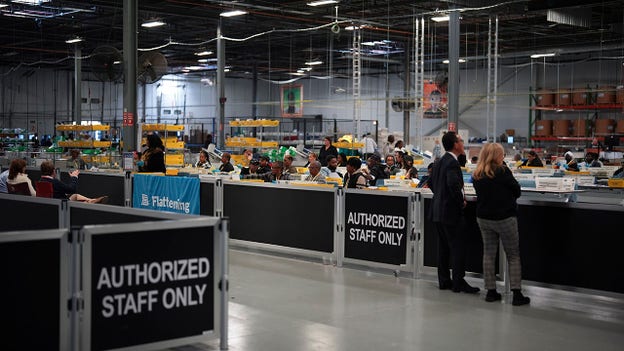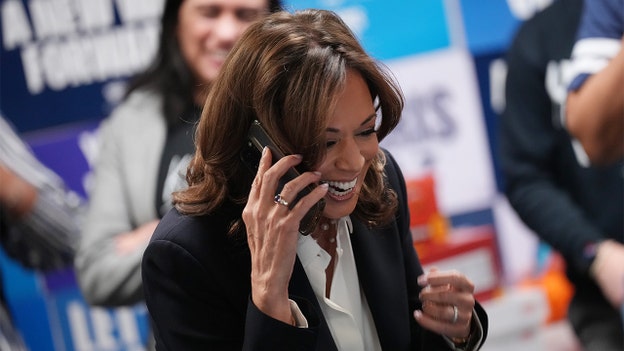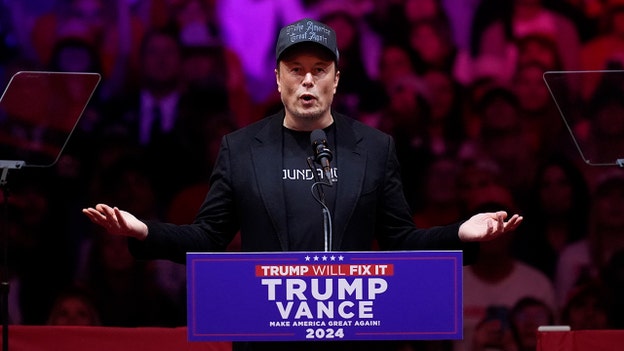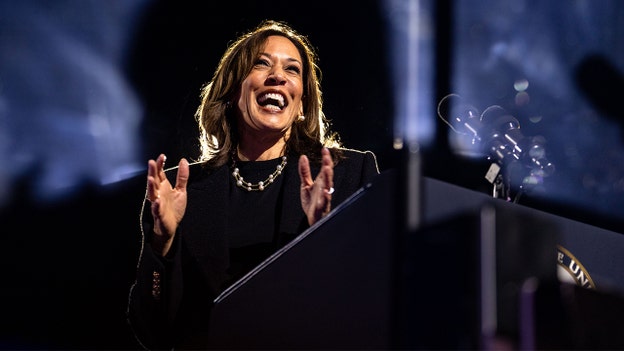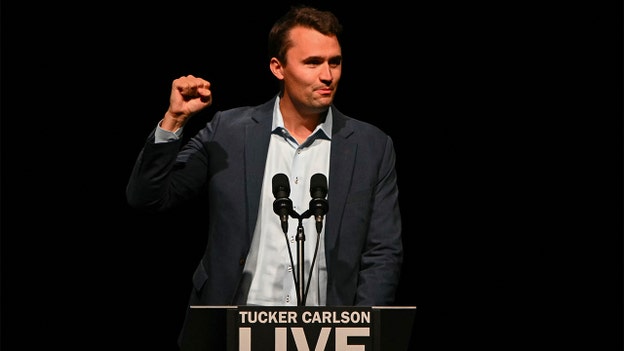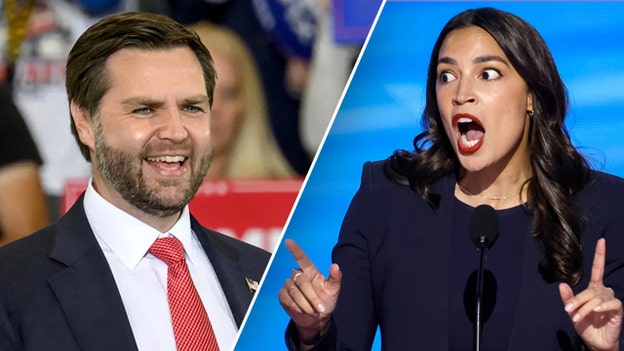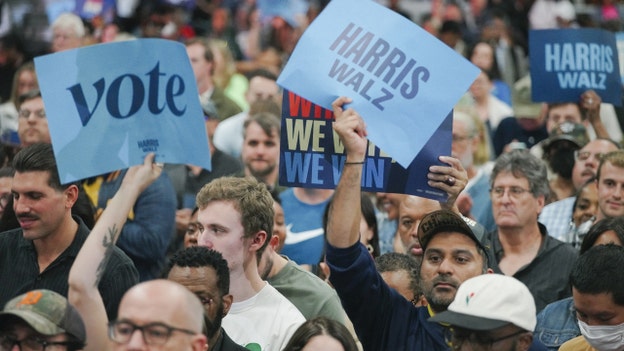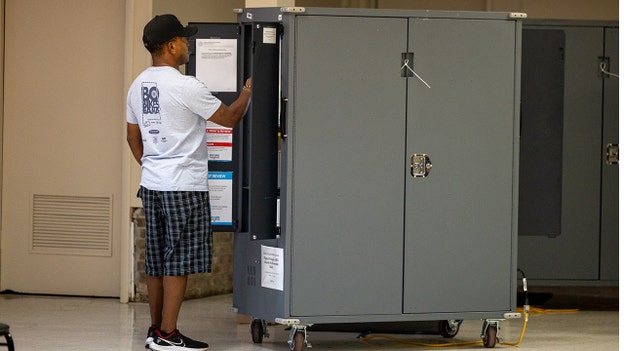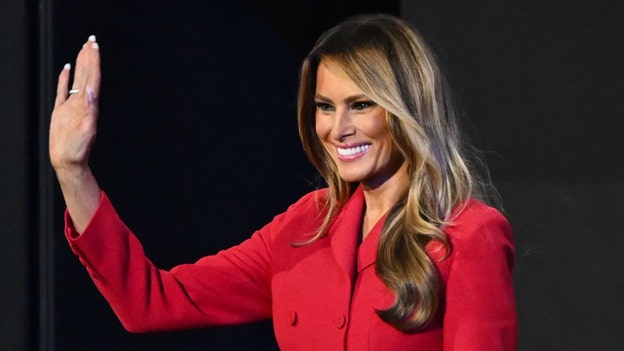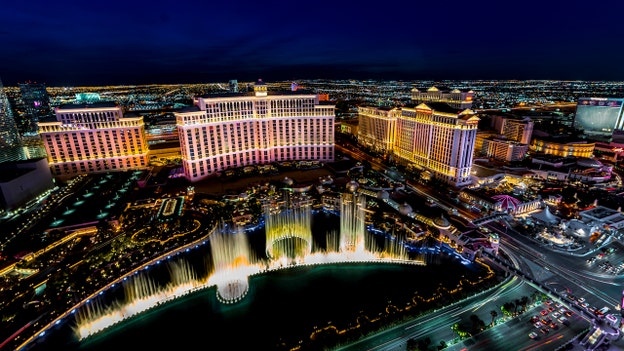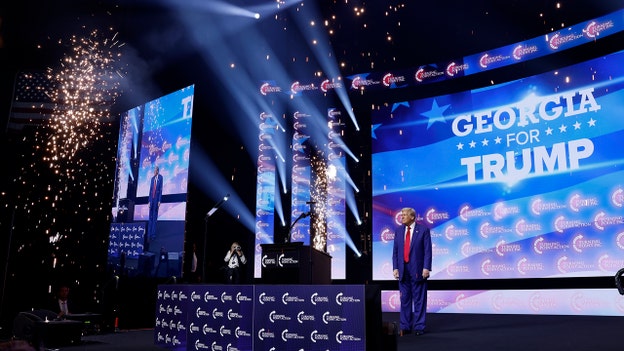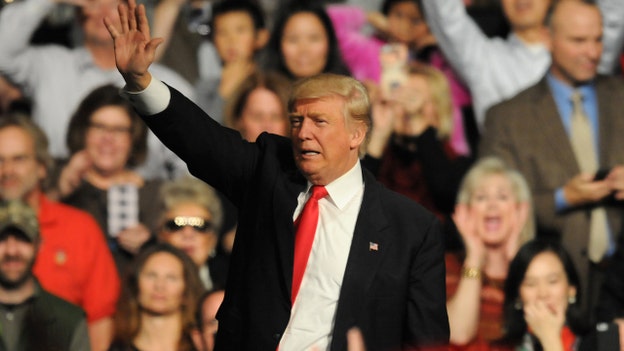America to decide the next president of the United States today
Former President Donald Trump and Vice President Kamala Harris go head-to-head at the ballot boxes across America today, November 5, 2024, in a race to determine the next President of the United States.
Coverage for this event has ended.
Fox News Digital is tracking closing polls and 2024 presidential election results in real-time. Follow along all night for voter analysis, latest news and Election Day results.
The Georgia Secretary of State’s office said the state has hit 900,000 voters statewide on Election Day, Fox News has learned.
The office told Fox News earlier that it was on pace for 1.2 million voters on Tuesday alone.
Polls close at 7 p.m. ET, meaning 68% of the state’s voters have now voted. The early voting tally was 4 million ballots cast and 55% turnout.
Republicans in Georgia are “cautiously optimistic” about their chances of winning the key battleground, party Chairman Josh McKoon told Fox News Digital.
“I am cautiously optimistic. Rural turnout is steady,” McKoon said on Tuesday afternoon. “Urban turnout appears to be lower than 2020 or 2022 at the moment.”
Both the Trump and Harris campaigns have poured enormous time, energy and resources into Georgia, a state the former president lost by less than 12,000 votes in 2020.Rural turnout was unusually high during Georgia’s early voting period from Oct. 15 through Nov. 1, fueling GOP confidence that they could retake the state after Democrats made significant gains in the previous two elections.
Earlier, a judge in Cobb County, Georgia – part of the Atlanta suburbs – extended voting hours at two polling places after they delayed opening on Tuesday morning.
Georgia’s secretary of state promised the battleground’s elections would be “fair and fast.”
Voter turnout in Philadelphia has been “extremely high" on Election Day, local Democratic Party Chairman Bob Brady told Fox News.
“As of 3:30pm we are at 60% turnout with more than four hours left. In 2020 we hit 65% turnout in Philadelphia," said Brady, a former congressman. "We think we'll get 70% - hoping for 80% voter turnout."
“Voter turnout in Philadelphia is extremely high,” he added. “We are predicting very high turnout - much higher than 2020. The African American numbers are coming in high - a lot of women. The Puerto Rican vote is also extremely high. We hope to get to Obama's numbers.”
Vice President Kamala Harris arrived at the Democratic National Committee headquarters Tuesday afternoon to phone bank hours before the first polls close.
"I just want to say hi and thank everybody for all you are doing," she told collected staff before manning the phones to contact potential voters.
Reporters attempted to ask the vice president questions, but she responded, "Gotta talk with voters."
Harris spoke to multiple people on the phone and urged them to follow through with their plans to vote on Tueday.
"I am well," she could be heard saying. "I just wanted to call you and check in and make sure you know where you can go vote today if you haven't already."
"Thank you so very much. You know, it's so important that everybody participates. And I thank you because I'm sure you've got a lot of other things you could be doing," she said.
Harris exited the room at 3:42 p.m.
Vice President Kamala Harris' plans for tonight, the evening of the 2024 presidential elections, include a return to her alma mater, Howard University in Washington, D.C.
Harris earned her bachelor's degree in political science and economics from the private, historically Black university.
Former President Donald Trump and Harris spent Monday night rallying in critical swing states for a final play at American voters.
Harris concluded her campaign stops in Scranton and Reading, both in Pennsylvania, while Trump made one last bid to the American people in North Carolina and Pennsylvania, before heading to Grand Rapids, Michigan.
Tonight, the president and first lady will watch election results in the White House Residence with long time aides and senior White House staff, according to a White House official. The president will receive regular updates on the state of races across the country.
Fox News' Patrick Ward contributed reporting.
From the mid-1940s to 1984, Wisconsin tended to favor Republicans. But Democrats won the seven elections from 1988 through 2012, though the 2000 and 2004 races were by razor-thin margins. Former President Donald Trump Trump broke that streak in 2016 when he won the state over Democrat Hillary Clinton by 0.7 percent. He cinched victory despite the fact that not a single one of the dozens of polls taken in the months leading up to the election favored him. Democrats took Wisconsin back in 2020 with President Joe Biden winning by 0.7 percent.
Wisconsin’s importance in the election was underscored by Republicans choosing Milwaukee for their nominating convention in July. The Badger State was also the site of Vice President Kamala Harris’ first top-of-the-ticket rally.
Democrats are seeking to repeat their “blue wall” of 2020 and win Wisconsin, Michigan and Pennsylvania - to counter any losses they may suffer in sunbelt states.
A judge in Cobb County, Georgia has ordered two polling places in Marietta and Kell to stay open until 7:20 p.m. ET after these locations had delayed opening earlier on Tuesday morning.
Additionally, a Pennsylvania judge has ordered polling place hours in Laflin Borough to be extended until 9:30 p.m. after polls opened late and some voters could not cast their ballots earlier.
Local news station WNEP reported that the judge of elections was not present at the Laflin location when polls were supposed to open at 7:30 a.m. The first ballots were not cast until 8:30 a.m. Some voters said they had waited in line for nearly two hours before they were able to vote.
Both Georgia and Pennsylvania are key battleground states in the 2024 presidential election, viewed as must-win by former President Trump's and Vice President Kamala Harris' campaigns, respectively.
SpaceX and Tesla CEO Elon Musk will spend election night with former President Donald Trump in Florida, sources with knowledge confirmed to Fox News Digital.
The New York Times first reported the news, citing two people familiar with Musk’s schedule, that Musk will be among a small group of people watching the election results with Trump as they come in.
Trump later in the evening will host a larger audience at the Palm Beach County Convention Center.
The former president has already cast his ballot Tuesday in Palm Beach, Fla., where his Mar-a-Lago residence is located.
Musk, following the first assassination attempt against Trump in Butler, Pa., in July, wrote on X "I fully endorse President Trump and hope for his rapid recovery."
Musk has since campaigned for Trump heading into Election Day.
Vice President Harris used her remaining campaign time before Election Day to make a stop in Pennsylvania alongside Rep. Alexandria Ocasio-Cortez, D-N.Y., a member of the progressive "Squad."
Harris visited Old San Juan Café in Reading with Ocasio-Cortez and Pennsylvania Gov. Josh Shapiro on Monday night. Rep. Chrissy Houlahan, D-Penn., and Reading Mayor Eddie Moran also joined.
Supporters chanted "Sí, se puede" and "Kamala" as the vice president’s motorcade pulled up to the café. Harris chatted with some diners inside and later ordered cassava, yellow rice and pork, saying, "I’m very hungry" as she noted that she has been too busy campaigning to find time to eat.
Diana de La Rosa, owner of the café, told the Reading Eagle that she was glad the vice president took the time to visit her business.
"[Harris] said she was very proud of me, that my restaurant is beautiful, and that she is very proud of women in business," de La Rosa told the outlet.
While in Reading, Harris also canvassed with supporters, knocking on doors.
This is an excerpt from an article by Fox News Digital's Stephen Sorace.
A Black Lives Matter activist on the eve of Election Day slammed Vice President Kamala Harris and said that he plans to vote for former President Trump.
"Kamala Harris would use anything to her advantage. I definitely would not be supporting Kamala Harris. If she ever got anywhere close to power, it would be a disaster for this country," said co-founder of Black Lives Matter [BLM] Rhode Island Mark Fisher in an interview with The New York Post published on Monday.
Three years ago, Fisher led the BLM Rhode Island’s effort to demand Democratic Sen. Sheldon Whitehouse resign or sever ties with an all-White and exclusive Newport Beach club.
Fisher explained further to the New York Post that historically, the Democratic Party has been the party Black people overwhelmingly voted for, yet, never "got anything in return." He also cited "abysmal" poverty and crime and a "failing" education system in Black communities.
The "lifelong Democrat" voted for President Biden in 2020, a decision he "regrets."
This is an excerpt from an article written by Fox News' Joshua Q. Nelson.
Vice President Kamala Harris has won the 2024 U.S. presidential election straw poll in Guam, according to unofficial results.
Harris defeated Trump 49-46%, claiming 13,510 votes to Trump's 12,624. Guam does not have any Electoral College votes and these results are symbolic. However, even though Harris won the results show a 10-percentage point swing away from the Democrats compared to the results in 2020.
In the 2020 election, Biden won Guam with 55% of the vote compared to Trump's 42%.
Though the straw poll has no impact on the election, the winner of every Guam straw poll between 1980 and 2012 went on to win the presidency. Democratic nominee Hillary Clinton won the poll in 2016, but Trump was elected president that year.
The unofficial results from Guam's election also indicate that Republicans will claim the majority in the territory's legislature, Pacific Daily News reported.
Republican Del. Jim Moylan will remain Guam's delegate to the U.S. House of Representatives.
Turning Point USA founder and CEO Charlie Kirk said Republican turnout is "mixed" and "not where we want it to be" hours before the first polls will close on Election Day 2024.
The pro-Trump group is one of several organizations former President Trump's campaign has partnered with to run voter turnout operations.
"Turnout is mixed and not where we want it to be. We need more people to vote. We can't let turnout flatline," Kirk posted Tuesday on X.
"Text everyone you know. Make more noise. We need more," he added.
Turning Point has spent millions of dollars on a get-out-the-vote campaign in swing states including Arizona and Wisconsin, the Associated Press reported. The organization set a goal to raise $108 million for its "ballot chasing" operation in the 2024 election but fell short, according to NPR.
The group developed a voter mobilization app that grants access to detailed personal information of voters who can then be targeted by outreach efforts. The app has been criticized for lax security protocols to protect voters' information.
The Associated Press contributed to this update.
Former President Trump paid a visit to his campaign headquarters and thanked staff in West Palm Beach, Fla., after casting his ballot in the 2024 election.
"There's never been a movement like this, and we're going to turn our country around," Trump told his staff. "We're going to not let people that murder people come into our country. We're not going to let drug dealers come into our country and terrorists come into our country. Little things like that. People are not going to stand them. And that's why we're doing well. But you know what? We still have a time to go. So let's make sure that let's make sure that we have this under control. And some of you are going to see tonight, I would imagine. I hope all of you. So I'll be seeing it tonight and it'll be great."
Trump will host an election watch party at his Mar-a-Lago residence tonight.
Sen. J.D. Vance, former President Donald Trump's 2024 running mate, referred to Vice President Kamala Harris as "trash" during a speech on the eve of Election Day.
"The citizens of this country are not garbage for wanting to be able to afford groceries and a nice place to live. But in two days we are gonna take out the trash in Washington, D.C., and the trash's name is Kamala Harris," Vance declared.
In a post on X, Rep. Alexandria Ocasio-Cortez , D-N.Y., opined, "Not too sure that Republicans going from calling Puerto Ricans garbage to calling a woman garbage is the whiz-bang political chess move they think it is."
Comedian Tony Hinchcliffe faced criticism after cracking a joke in which he referred to Puerto Rico as "a floating island of garbage." He made the joke while speaking at Trump's rally at Madison Square Garden.
President Joe Biden later sparked controversy when he said, "The only garbage I see floatin' out there is his supporters."
This is an excerpt from an article written by Fox News' Alex Nitzberg.
Between 1972 and 1988, Michigan voted exclusively for Republican candidates in every presidential election. However, from 1992 until former President Donald Trump’s 2016 victory in the state, Michigan voted exclusively for Democratic presidential candidates, making it one of 18 states and Washington, D.C. – coined “the blue wall” – that voted Democrat in six consecutive presidential elections from 1992 through 2012.
Later, in 2016, Trump narrowly flipped the state in favor of Republicans by beating out Hillary Clinton by a margin of .2%. The state returned to voting for a Democrat in 2020, when Joe Biden beat Trump by a margin of 2.8%.
Margins of victory for either candidate have narrowed since the “blue wall” era as well. In 2012, the margin of victory for Barack Obama was almost 10%. Meanwhile, the combined margin of victory for both the 2016 and 2020 elections was 3%.
Michigan is largely considered a “toss up” battleground state, with 15 electoral votes at stake for the winner.
FIRST ON FOX: Sen. Bill Hagerty, R-Tenn., is firing a warning shot to agencies and departments within the federal government about a potential transition to a future Trump administration – telling the Democratic administration that it needs to follow federal requirements.
Hagerty has written to all federal agencies, in letters obtained by Fox News Digital, warning of applicable provisions in laws regarding appropriations that limit departments’ ability to transfer funds or change programs during the transition period.
"As we move into a presidential transition period, I write today to remind you of your statutory transfer-of-funds authority and change-of-program requirements under the Further Consolidated Appropriations and Extensions Act 2024…which will continue to apply with the same force during the transition," he wrote.
"Compliance with these requirements must be a priority for the outgoing administration, given the criminal and administrative consequences of failing to do so," he said.
He argues that the law limits moving funds, altering programs and prohibits employees from obligating federal dollars – with potential criminal sanctions or firing.
This is an excerpt from an article written by Fox News' Adam Shaw.
At least two polling places temporarily closed in Fulton County, Georgia, on Tuesday after authorities received "non-credible" bomb threats.
Fulton County police said the voting locations at the Etris Community Center and Gullatt Elementary school in Union City closed for a short duration Tuesday morning in response to the threats. The two polling locations were closed for about 30 minutes each, local news station 11 Alive reported.
"The Fulton County Department of Registration & Elections will seek a court order to allow these polling places to remain open for the same period as the temporary closure," police said.
Georgia Secretary of State Brad Raffensperger said at a press conference the threats were "of Russian origin."
"So they're up to mischief, it seems. And they don't want us to have a smooth, fair and accurate election," he said of Russia.
"And they think they can get us to fight among ourselves. They can count that as a victory. So that's as you talked a little bit about, the Russians. They're not our friends. Anyone that thinks they are hasn't been reading the newspapers."
The FBI said it was "aware" of the threats and agreed that they "appear to originate from Russian email domains."
"None of the threats have been determined to be credible thus far," the FBI said Tuesday.
With the eyes of the nation focused this week on the outcome of Election Day 2024, what's clear in her new book is how Melania Trump, former first lady, protects her own mental and psychological health no matter the events she's navigating.
She's the author of the current New York Times No. 1 bestseller, "Melania."
The personal memoir gives readers a rare look inside her life, starting with the moment she set foot on American soil as a 26-year-old and on through the assassination attempt on her husband, former President Donald J. Trump, this past summer in Butler, Pennsylvania.
Whether she's enjoying personal success or dealing with political chaos, whether she's celebrating family triumphs or weathering times of national turbulence, she figured out long ago how to stay calm, even-keeled and focused on what matters most, she reveals.
"Life's circumstances shape you in many ways, often entirely beyond your control — your birth, parental influences and the world in which you grow up," she writes.
This is an excerpt pulled from an article written by Fox News' Maureen Mackey.
Nevada has tripled its population over the last 40 years, consequently doubling its electoral representation from three to six votes.
With that influx came a more liberal populace: while Republicans dominated the state from the late 1960s to the late 1980s, it became a swing state after that. Democrats won in every election from 1976 to 2020 – except in 2000 and in 2004, when the state went for George W. Bush.
Hillary Clinton beat Donald Trump in 2016 48 to 46%, while in 2020, Joe Biden beat Trump by about 2.5%.
Barack Obama won the state by particularly large margins – 12.5 points against John McCain in 2008 and 6.7 points ahead of Mitt Romney in 2012.
In an effort to court Nevada’s many service industry voters centered in Las Vegas, Trump rolled out a “no tax on tips” campaign slogan - a promise to eliminate federal taxes on tipped wages. Harris followed suit and endorsed the same policy shortly thereafter.
Donald Trump took Georgia by a decent margin of roughly 5% in 2016, but in 2020, he lost by a narrow .2% of the vote. Georgia’s vote in favor of Joe Biden marked the first time the state has selected a Democrat since 1992.
Meanwhile, Georgia voted Democrat in every presidential election up until 1960.
However, amid the arrival and growth of the civil rights movement, Republicans deployed something known as their “Southern strategy” in order to recruit unhappy Democrats. From 1964 to date, Georgia has voted for 10 Republican presidents, four Democrats and one Independent.
This year, Georgia, is considered a “toss up” battleground state and could be pivotal in deciding who collects a simple majority of 270 Electoral College votes. Between 2000 and 2020, Georgia voted for the winning candidate 66.7% of the time, according to Ballotpedia.
Former President Trump spoke to reporters Tuesday after casting his ballot in West Palm Beach, Florida.
"I feel very confident," Trump said. "I have felt, you know, we went in with a very big lead today and it looks like Republicans have shown up in force. So we'll see how it turns out."
Asked if he had any regrets about his third campaign for president, he said "you always have regrets" but that "I can't think of any, to be honest."
"I ran a great campaign. It was maybe the best of the three. We did great in the first one. We did much better in the second one, but something happened. And this was the best, I would say this was the best campaign we ran."
The Republican nominee acknowledged that the results of the election may not be known Tuesday night and complained about mail-in ballots. Asked if he could see a world where he does not declare victory on Tuesday, Trump said, "Yeah."
"I mean, I'm hearing the same things that you're hearing. I'm hearing states where I'm up by a lot but they won't have a final number for a long time."
Since 2000, Arizona has voted Republican in every previous presidential election, with the exception of Joe Biden in 2020. Former President Donald Trump carried Arizona in 2016 by more than 3.5%, but in 2020, he lost by 0.3%.
Before Biden's victory, the last Democratic presidential candidate Arizona voted for was Bill Clinton in 1996, when he secured a win over Republican Bob Dole by a margin of 2.2%.
Between 1912 and 2020, Arizona has voted for a Democratic president 32.1% of the time, while it has voted for a Republican president 67.9% of the time, according to Ballotpedia. Meanwhile, Arizona has voted for the winning presidential candidate nearly 79% of the time during the same time period.
Arizona holds 11 electoral votes for whoever wins the state and its propensity to pick correctly has given it the reputation of being a bellwether for the rest of the country.
American intelligence officials released a recent statement warning about Russian actors conducting "additional influence operations" to impact the upcoming election on Tuesday.
The Office of the Director of National Intelligence (ODNI) published the latest update on its website on Monday evening. Speaking on behalf of the Federal Bureau of Investigation (FBI) and the Cybersecurity and Infrastructure Security Agency (CISA), the ODNI detailed the latest intelligence findings.
Last week, officials said that they observed Russian actors creating and disseminating a fake video that showed individuals voting illegally, and a video accusing a politician of taking a bribe. Since then, the U.S. Intelligence Community (IC) has observed Russia and other foreign adversaries "conducting additional influence operations intended to undermine public confidence in the integrity of U.S. elections and stoke divisions among Americans."
"The IC expects these activities will intensify through election day and in the coming weeks, and that foreign influence narratives will focus on swing states," the statement read.
Of all the foreign adversaries seeking to impact the election, the ODNI said that Russia "is the most active threat."
"Influence actors linked to Russia in particular are manufacturing videos and creating fake articles to undermine the legitimacy of the election, instill fear in voters regarding the election process, and suggest Americans are using violence against each other due to political preferences, judging from information available to the IC," the ODNI continued. "These efforts risk inciting violence, including against election officials."
"We anticipate Russian actors will release additional manufactured content with these themes through election day and in the days and weeks after polls close."
This is an excerpt from an article by Andrea Margolis.
A Pennsylvania judge ordered voting to be extended until 10 p.m. ET after a "malfunction" prevented voters in Cambria County from scanning their ballots.
"The Cambria County Board of Election learned early this morning that a software malfunction in the County's Electronic Voting System has prevented voters from scanning their ballots," County Solicitor Ron Repak said in a statement. "This should not discourage voters from voting at their precincts."
Elections officials emphasized that no one who wishes to cast their ballot will be turned away and that all votes will be counted.
"All completed ballots will be accepted, secured, and counted by the Board of Elections. The County Board of Elections has express voting machine [sic] at precinct locations to continue to allow voting electronically, while still allowing hand ballots to be cast," said Repak.
"In summary, all votes will be counted and we continue to encourage everyone to vote."
The Pennsylvania Department of State said it was working with local officials to resolve the issue.
"The Department of State is in contact with county officials in Cambria County. Voters are continuing to vote by paper ballot, in accordance with normal operations, while the county resolves the issue with in-precinct scanning. We are working with the County to resolve this technical matter and remain committed to ensuring a free, fair, safe, and secure election."
Former President Trump will host an election night watch party in West Palm Beach, Florida, after casting his ballot in the Sunshine State earlier today.
The party will be held at his personal residence at Mar-a-Lago.
“It is now officially ELECTION DAY! This will be the most important day in American History. Voter enthusiasm is THROUGH THE ROOF because people want to Make America Great Again,” Trump posted on social media. “That means lines are going to be long! I need you to deliver your vote no matter how long it takes. STAY IN LINE! The Radical Communist Democrats want you to pack up and go home. Together, we are going to have a tremendous victory and MAKE AMERICA GREAT AGAIN!”
Trump returned to Florida after concluding his third and likely final campaign for president in Grand Rapids, Michigan, on Monday night. He bid farewell to his trademark rallies, thanking his supporters and urging them to vote.
"Your support means more than anything you can even understand… this is my last rally, can you believe it? The rallies, these big beautiful rallies, there’s never been anything like it and there never will be," Trump told supporters at Van Andel Arena in Grand Rapids, Michigan at a rally in the early morning hours on Tuesday.
Fox News Digital's Michael Lee contributed to this update.
Pennsylvania, a key battleground state in U.S. elections, has swung between both the Republican and Democratic parties throughout the years. From 1992 until 2012, Pennsylvania voted Democrat in its presidential elections, but that changed in 2016 when former President Donald Trump narrowly won Pennsylvania over former Secretary of State Hillary Clinton — a departure from its historically Democratic preference.
With the ailing steel industry a vital part of the Rust Belt state’s economy, many old school, union Democrats were drawn to Trump’s talk of bringing manufacturing back to the U.S. in 2016.
In 2020, President Joe Biden reversed the trend, securing the state for the Democrats once again and playing a key role in his overall victory.
The state's two major metropolitan hubs – Pittsburgh and Philadelphia – which sit on the opposite ends of the state – reliably vote Democratic, but the vast span of rural cities and towns in between tend to lean Republican.
It’s hard to win the White House without Pennsylvania, which, at 20 electoral votes, has the most of any swing state.
Vice President Kamala Harris has been a vocal supporter of codifying Roe v. Wade abortion protections into federal law and expanding abortion access in every state. The Democratic presidential nominee also said in September she supports eliminating the 60-vote filibuster requirement in order to reinstate the controversial 1973 decision.
The filibuster is a Senate rule that allows a minority to block legislation pending a supermajority vote, so ending it would make it easier to pass laws related to abortion rights. While Harris first said she would support ending the filibuster to resurrect Roe in 2022, she has since made abortion a central issue in her Democratic bid for presidency.
Even prior to Harris replacing President Joe Biden as the Democratic frontrunner, Harris made a push within the administration to restore Roe v. Wade protections.
“It is absolutely about health care and reproductive health care. So everyone get ready for the language: ‘uterus,’” Harris said at an abortion clinic in Saint Paul, Minnesota, in March. “That part of the body needs a lot of medical care from time to time."
Former President Donald Trump won about half of the 50 states in 2020 but it was not enough to get him across the finish line as far as the Electoral College is concerned.
Trump won about 47% of the popular vote and 232 electors, to Joe Biden's 306 electors.
In all, Trump won Alaska, Idaho, Utah, Wyoming, Montana, North Dakota, South Dakota, Kansas, Oklahoma, Texas, Iowa, Missouri, Arkansas, Louisiana, Indiana, Ohio, Kentucky, West Virginia, Tennessee, Mississippi, Alabama, Florida, South Carolina and North Carolina.
Two states, Nebraska and Maine, divvy up their presidential electors by congressional district.
In Maine, Trump was awarded one elector from the Pine Tree State's rural 2nd congressional district, and in Nebraska, was awarded four electors for winning the two geographically larger of the three congressional districts. Biden was awarded one elector from Nebraska for winning the district mostly encompassing urban Omaha.
Biden's victory largely hinged on his very narrow victories in Arizona, Georgia, and Pennsylvania -- states where Trump upset his 2016 opponent, Hillary Clinton.
This cycle, Trump also has eyes on otherwise outlier states like New York and Virginia.
Both are heavily blue, electorally speaking, but encompass vast rural areas friendly to conservative politics, such as Southside Virginia and the Adirondack region of New York.
In 2020, President Joe Biden and Vice President Kamala Harris won 25 states, the District of Columbia and part of one state which divides its electoral votes. The Democratic ticket that year swept the Lower 48’s Pacific coast, winning California, Oregon and Washington – as well as Hawaii.
It also won the desert states of New Mexico, Arizona and Nevada. Biden and Harris won Colorado as well as one of Nebraska’s electoral votes.
Biden-Harris performed well in the upper Midwest, winning Minnesota, Illinois, Wisconsin and Michigan, as well as the swing states of Pennsylvania and Georgia.
While former President Trump made a play for Virginia, which is deeply red outside the Washington, D.C. metro area, the Democrats took home the Old Dominion.
Biden and Harris also won the District of Columbia, Delaware, Maryland and every electoral vote in New England except one in Maine – which, like Nebraska, divvys-up its votes.
Republican candidate for vice president Sen. JD Vance, R-Ohio spoke to reporters after casting his ballot in Cincinnati on Tuesday and urged voters to support former President Trump in the 2024 Election.
"I feel good," Vance said. "You never know until you know. But I feel good about this race. I felt good about my own race a couple of years ago, when I voted in this exact same spot. Hopefully it goes as well for President Trump and me as it went for me a couple of years ago in the state of Ohio."
Asked if he had a message for Democratic voters, Vance said that all Americans are "fundamentally on the same team" regardless of who wins.
"Well, look, I think our message is, first of all, we do expect to win. But obviously, no matter who wins, half the country, as you said, is going to be at least partially disappointed. I think my attitude is the best way to heal the rift in the country is to try to govern the country as well as we can, create as much prosperity as we can for the American people and remind our fellow Americans that we are all fundamentally on the same team, however we voted," he said.
"I certainly hope you vote for Donald Trump today. I think that his policies are going to promote peace and prosperity for our citizens. But if you vote the wrong way, in my view, I'm still going to love you. I'm still going to treat you as a fellow citizen. And if I am lucky enough to be your vice president, I'm going to fight hard for your dreams and for your family over the next four years."
While he lost the popular vote by nearly 3 million, Donald Trump scored a victory in the Electoral College in 2016 largely thanks to upset victories in the Rust Belt states. That was fueled in part by what strategists believe was a lack of focus on the region by Hillary Clinton.
Ultimately, Trump received 304 electoral votes and Clinton 227: he flipped six states won by Democrats in 2012: Florida, Iowa, Michigan, Ohio, Pennsylvania, Wisconsin and Maine’s 2nd congressional district.
He lost Nevada – which Republicans are trying to flip in their favor this year – but won virtually every other state that could potentially be up for grabs in this election, including Georgia, North Carolina, Arizona and Texas.
While Republicans typically count out California’s 55 electoral votes and New York’s 29, which reliably favor Democrats, in recent elections, including 2016, they’ve been boosted by Texas’ 38 votes and Florida’s 29.
There are seven swing states which are considered “toss up” in this year’s presidential election, according to Cook Political Report’s Electoral College ratings. Those states are Arizona, Georgia, Michigan, Nevada, North Carolina, Pennsylvania and Wisconsin. Pennsylvania, North Carolina, Georgia and Michigan are the most coveted of the seven, because they each have at least 15 electoral votes. The rest award only 11 or fewer.
Pennsylvania holds the most votes and has emerged as the most critical battleground state in this year’s presidential election cycle. The state has played host to the only presidential debate. Harris unveiled her economic platform in the Keystone State. And former President Donald Trump was almost assassinated in the state while campaigning in the small town of Butler. Trump won the state by 1 percentage point in 2016, but lost it by the same margin in 2020.
Georgia and North Carolina, both of which carry 16 electoral votes, are close runners-up to Pennsylvania, in terms of importance for the campaigns. North Carolina hasn’t voted for a Democratic president since 2008.
Trump ally and British parliament member Nigel Farage says Vice President Kamala Harris should pardon the former president if he loses in order to “dampen down potential tensions” following Election Day.
Farage, the leader of the Reform UK party, made the remark this week in an interview with The Telegraph, during which he declared that “I still think he is going to win.”
“If she gets in on Tuesday I hope she pardons him. She could look magnanimous and it would dampen down potential tensions,” Farage said.
In September, Judge Juan Merchan decided to postpone Trump’s sentencing in New York v. Trump until after the presidential election. Trump had been found guilty in an unprecedented criminal trial on all 34 counts of falsifying business records in the first degree.
Farage was spotted at Trump's rally in Reading, Pennsylvania, on Monday evening. On Tuesday morning, he posted a video from the Keystone state predicting a Trump victory.
Fox News Digital's Greg Norman contributed to this update.
An observation: The Harris campaign has not been talking much about early voting data. When they have figures they feel good about, they share them – like last week, when they announced that women have made up 55% of early voters across battleground states.
But for the past two days, we’ve received few hard numbers on young, Black, and Latino early turnout – instead they’ve been sharing numbers for doors knocked and calls made.
They have shared some anecdotes – like high young voter turnout in college towns, where you’d expect it, and statements about enthusiasm. But they’re not giving out the kind of details that the Trump campaign is touting – like the Republican share of the early vote among new or infrequent battleground voters, Republican share of male vote across battlegrounds, and returned mail and early turnout comparisons to 2020.
The Harris campaign maintains they still have multiple pathways to 270 – but publicly they’re projecting less confidence than in previous cycles at this point. It may be that the GOP embracing early voting wound up increasing turnout among lower propensity Republican voters, which is giving Dems heartburn.
Harris is obviously animating a different swath of the electorate than Biden did in 2020, but it’s also but it’s also interesting that the final two weeks of Biden’s 2020 campaign included 4 stops in Florida, 3 in Ohio, and 1 in Iowa. Harris is spending more of her time in Dem strongholds, trying to lock down and turn out the base.
Another challenge for anyone trying to read the tea leaves: polls have not accurately measured either the impact of Dobbs or support for Trump in past elections.
This post originally appeared on X.
House Speaker Mike Johnson, R-La., predicted that Republicans will win big tonight bolstered by turnout from first-time supporters.
"I have been everywhere. We've been in Pennsylvania, of course, but I've done campaign events in over 260 cities across 40 states. We did two in Virginia yesterday. We've been all over the place. So, there are people coming to the events, Rachel, that have never been there before. And I think the Hispanic and Latino vote is going to be historic this time," Johnson told "Fox & Friends Weekend" co-host Rachel Campos-Duffy.
He said he thinks there will be a demographic shift towards Republicans from voters who believe "the Democratic Party has abandoned the values of their community."
"My gut tells me that we are going to outperform the polls," Johnson added. "The polls have him about even everybody says it's a coin toss, if that's true. Trump always outperforms the polls. I believe it. But I want to say every single vote counts, especially in the swing states. Take nothing for granted. We need every single vote today."
Georgia, Nevada, Pennsylvania, Wisconsin, Michigan, North Carolina and Arizona are the seven swing states widely expected to be the ones to determine the 2024 presidential election.
Of the swing states, the Democrats’ “blue wall” is considered the lynchpin of Democratic victory. Pennsylvania, Wisconsin and Michigan were all reliably blue states until Trump won them in 2016, and the gap has been closing ever since as blue collar Rust Belt voters trend rightward. Biden recaptured all three states in 2020.
Nevada has flip flopped somewhat regularly in the past but has gone reliably blue since 2008.
Georgia, North Carolina and Arizona are all reliably Republican states that have been drifting blue in recent years. Hillary Clinton captured Georgia in 2016 and narrowly won in North Carolina and Arizona. In 2020, Biden took Arizona and Georgia, whereas Trump held onto North Carolina.
According to recent Fox News polling, Harris is up by one point in Arizona and two points in Georgia and Nevada, with Trump maintaining a one-point lead in North Carolina. Harris leads Trump by four points in Wisconsin, two in Pennsylvania, and Michigan is a dead heat between the two.
U.S. Transportation Secretary Pete Buttigieg defended Vice President Kamala Harris' policies on Tuesday morning, making a final pitch to voters on why the Democratic nominee should be elected president.
Appearing on "Fox & Friends," Buttigieg said Harris has "been very clear about her policies down to the percentage point level," citing her proposal to raise the capital gains tax to 28%. He contrasted Harris with Republican nominee former President Trump, who he argued "to this day can't even say what his health care plan is, just a 'concept of a plan.'"
"Look, we know the fundamentals of the differences in economic vision. He's going to do tax cuts for the rich and he's going to do this import tax, the tariff that will add $4,000 for a typical family. She's going to do a child tax credit expansion and middle class tax cuts," he said.
The secretary clashed several times with host Brian Kilmeade, who challenged Buttigieg's assertion that Trump's tax cuts mostly benefitted the wealthy. Pressed on Harris' energy policies, Buttigieg also denied that Democrats have any plans to mandate electric vehicle purchases.
Millions of Americans will vote in person in the 2024 Election on Tuesday as the nation decides who will be the next president of the United States.
As of 8 a.m. ET, polls are open in 38 states and the District of Columbia.
Polls opened in certain parts of Vermont at 5 a.m. ET on Nov. 5, quickly followed by Connecticut, Kentucky, Maine, New Jersey, New York and Virginia at 6 a.m.
North Carolina, Ohio and West Virginia began voting at 6:30 a.m.
At 7:00 a.m., polls opened in Alabama, Delaware, the District of Columbia, eastern Florida, Georgia, New Hampshire, Illinois, Indiana, Kansas, Louisiana, Maryland, Massachusetts, Michigan, Missouri, Pennsylvania, Rhode Island, South Carolina and Wyoming.
At 8 a.m., polls opened in Arizona, western Florida, Iowa, Minnesota, Mississippi, Oklahoma, North Dakota, South Dakota, Tennessee, Texas and Wisconsin.
Arkansas is next to open at 8:30 a.m.
Polls will be open nationwide by 12 p.m. ET.
While the majority of voting locations face few problems on Election Day, there have been some notable issues in the past that are worth mentioning.
The chief among them, with special relevance this year due to a series of brutal hurricanes hitting the southeast, is weather and other environmental impacts. During the 2024 Republican primaries, a blizzard in Iowa was feared to affect turnout by all sides and, in 2020, whether or not the coronavirus pandemic would affect turnout was closely monitored. Additionally, multiple studies have affirmed that bad weather conditions can negatively affect turnout among less determined voters.
Additionally, a growing trend in recent years has been protesting outside of polling locations. All states have laws against electioneering, political activity near polling locations, so they can only do so much. During the 2020 election, Trump supporters held a protest outside of a polling location in Virginia and armed protestors have been spotted outside of vote counting locations in the aftermath of the election.
Early in-person and mail-in ballots have begun pouring in across the country, and the tally in each state reveals mounting voter enthusiasm.
States have long allowed at least some Americans to vote early, like members of the military and people with illnesses unable to get to the polls. Many states expanded eligibility in 2020 during the COVID-19 pandemic.
In the last presidential election, mail ballots tended to skew Democratic. In 2020, 60% of Democrats reported voting by mail, compared to 32% of Republicans, according to a 2021 study from the MIT Election Data and Science Lab.
As of Monday evening, over 81 million ballots have been cast nationwide.
This is an excerpt from an article by Morgan Phillips and Rémy Numa.
The weather forecast for most of the country will be rather tranquil for Election Day, with large parts of the East and West coasts remaining dry, but a cold front stretched across the heartland will be the focal point for showers and thunderstorms.
The frontal boundary will mean cities such as Chicago, St. Louis and even Tulsa, Oklahoma, will be in the rain zone, and behind the front, cooler air will exist over much of the Rockies and Plains. Those in the Northwest could have snow in the forecast for Election Day.
According to the FOX Forecast Center, some battleground states, including Michigan and Wisconsin, are likely to see rain on Election Day. Meanwhile, temperatures in northern Nevada are expected to dip below freezing, where snow is possible.
Voters in western North Carolina will be casting their ballots in the wake of Helene's deadly flooding. As cleanup efforts continue in the region, temperatures will be in the 50s and 60s in places like Asheville, which was hit hard by the devastating flooding.
Political experts contend weather conditions on Election Day – whether rainy or sunny – can influence voter enthusiasm. However, with over half the country voting in advance of Nov. 5, Election Day increasingly resembles an extended election season rather than just a single, important day.
A 2007 university study found that Republican-leaning voters turned out more than those voting for Democrats during rainy weather. Researchers found that voter participation dropped off about 1% per inch of rain, and snowfall decreased turnout by nearly half of a percent for every inch of accumulation.
With the majority of the electorate taking advantage of early voting methods, millions will have little to do on Election Day other than relax and watch the results come in.
This is an excerpt from an article by FOX Weather's Andrew Wulfeck.
During the 2020 election, the formal verification of votes within several swing states trickled in over the month of November. Many of the states called the race before the votes were formally verified, leaving many people confused as to why.
The reason for the delay primarily had to do with mail-in voting and the methods by which it is counted. When someone votes by machine, everything is automatically tracked and logged by the computer. When one votes by mail, every aspect of that needs to be handled manually — letters need to be opened, signatures verified, voting sleeves inserted into machines, etc. The unprecedented amount of mail-in votes that were submitted, mostly due to the coronavirus pandemic, bogged down the system and led to delays.
Additionally, while many states get a jump on the process, states like Pennsylvania do not permit workers to begin counting and certifying votes until Election Day. Some states, like Nevada, accepted ballots that arrived up until a week later, so long as they were postmarked on Election Day. All of these small factors combined led to the race being called roughly four days after Election Day.
Americans can expect, based on past elections, for some states to see delays in counting ballots on Election Day.
While the 2024 election is set to take place on November 5, it can take days, or even weeks, for every state to certify their election results.
Arizona, which did not certify its 2020 election results for several weeks, usually experiences a delay in ballot counting. The state enacted a new step in the ballot counting process this cycle, which could add even more time to the process, to require ballot counters to hand count ballot envelopes dropped in ballot boxes before they are tabulated.
This year, however, several swing states are implementing new rules for counting ballots in an effort to certify the results sooner.
Nevada ballot counters will be able to begin counting votes in the morning on Election Day, as opposed to years prior when they could not begin until early voting closed.
Michigan will allow for ballots to begin being counted eight days ahead of Election Day in an effort to certify the results at a faster pace.
Vice President Kamala Harris has focused her 2024 campaign around several policy issues, some of which she flipped on since her 2019 presidential bid.
Immigration – Millions of illegal immigrants have come through the southern border after the Biden-Harris administration halted the Trump-era "Remain in Mexico" policy. Harris has described the issue at the southern border as a "crisis" and top issue of concern during her campaign, frequently mentioning her support for a bipartisan border bill as reference to her support for border legislation.
The economy – Harris has put an emphasis on lowering prices, saying she will implement a child tax credit of $6,000 for low to middle- income parents of newborns. The proposal is similar to that of GOP vice presidential candidate Sen. JD Vance, who proposed a $5,000 child tax credit.
Health care – The Democratic nominee has highlighted creating what she calls an "opportunity economy," if elected. She touted expanding the Affordable Care Act and making permanent the Biden-Harris tax credits.
Abortion – The vice president has also made abortion access another focal point of her campaign and that she backs eliminating the 60-vote filibuster requirement in order to reinstate Roe v. Wade, which would federalize abortion access nationwide.
Guns – Harris has said that if elected, she would ban semi-automatic rifles and high-capacity magazines, require universal background checks and support red flag laws. She also said she would crack down on unlicensed gun dealers.
On the eve of the U.S. election, former President Trump received a round of last-minute endorsements from high-profile names, including Joe Rogan and Roberto Clemente Jr., son of the baseball legend.
With less than 24 hours to go before the election, podcaster and comedian, Joe Rogan formally endorsed Trump for president, ending speculation.
Posting on X, Rogan highlighted his nearly three hour interview with SpaceX CEO Elon Musk, who has already supported Trump.
"The great and powerful @elonmusk. If it wasn't for him we'd be f---ed," Rogan said. "He makes what I think is the most compelling case for Trump you'll hear, and I agree with him every step of the way."
And leaving no room for doubt, Rogan wrote: "For the record, yes, that's an endorsement of Trump."
Earlier Monday, Robert Clemente Jr., son of the Puerto Rican baseball legend, formally endorsed Trump in the city where his father played.
Clemente Jr. joined Trump on stage in Pittsburgh where he praised the former commander-in-chief.
"For the first time, I had to take a step forward. It is very important for me to support this man, because I believe tomorrow is a change of time," Clemente Jr. said. "My father, the name Clemente, what it means is goodwill and unity. I believe that your team is going to bring it all home. I believe in everything that you stand for right now," he told Trump.
And earlier Monday, Randi Mahomes, the mother of star Kansas City Chiefs quarterback Patrick Mahomes, endorsed Trump during a game against the Tampa Bay Buccaneers.
This is an excerpt from an article by Bradford Betz.
Former President Donald Trump has focused on relaying his position on five key issues during campaign stops this cycle.
Since launching his re-election campaign, Trump has focused heavily on the issue of illegal immigration and has blamed the Biden-Harris administration for the influx of migrants that have come through the southern border after they halted the Trump-era "Remain in Mexico" policy.
The former president has also made the economy a focal point of his race, frequently pointing out high prices and referring to the state of the economy under his administration during campaign stops.
Energy has also been one of Trump's top issues this cycle. The former president has made various campaign stops in key oil dominant states, such as Pennsylvania and Michigan, to tell voters that he wants to "unleash energy dominance," if elected.
Trump has highlighted crime in major cities across the U.S., which he has tied to the immigration crisis. He has expressed staunch support for law enforcement and funding police departments across the U.S.
Throughout his campaign, Trump has advocated for "free and open trade." He vows to strengthen U.S. manufacturing and end reliance on countries like China.
Election Day has a long and interesting history as the development of the country and its history was formed.
The first Election Day was held on November 7th, 1848 when Whig party candidate Zachary Taylor defeated Democratic candidate Lewis Cass. This was the first time that a presidential election was held on a fixed date thanks to legislation passed by Congress in 1845 to deter voter fraud.
The Constitution does not say when election day was to be held and Election Day was decided by farming communities and the harvest season. Election Day was held in November because in the 1800s most citizens worked as Farmers and lived far from polling places, often having to travel a day or two to vote in a single election and in November the busy harvest season came to an end which gave time for farmers to vote which varied throughout the states.
It was not until 1845 that congress stepped in to make a uniformed day for presidential elections leading to the creation of a Federal Election Day.
Fox News' Emma Woodhead contributed to this report.
After the election is called, each state’s votes will be used to indicate which slate of electors voters want to appoint for the Electoral College vote. When voters submit their ballots on Election Day, they are actually determining which candidates’ and state parties’ electors they want to vote in the Electoral College. Once everyone has voted and the election winners in each state are called, the state’s executive is expected to prepare a certificate of Ascertainment of appointment of electors, which names the electors and the votes cast. The certificates must be issued at least six days before the Electoral College vote in mid-December.
On the day of the electoral vote, electors meet in each state and record their votes. Afterward, the electors sign, seal, and certify several sets of the votes. A sealed certificate of the votes is sent to the President of the Senate and the Archivist and has to be received before the fourth Wednesday in December. Then, on or before Jan. 3, the archivist transfers sets of the certificates to Congress. On Jan. 6, Congress meets in a joint session to count the electoral votes. The President of the Senate then declares the winner of the election. On Jan. 20, the president and vice president are inaugurated.
Recent U.S. elections have been rife with accusations of voter fraud – and in particular, claims that the names of dead persons are used to illegally obtain and cast ballots in favor of a certain candidate. But this type of voter fraud in U.S. is actually exceedingly rare as concluded by a number of studies, including research that was commissioned at the behest of Trump’s 2020 presidential campaign.
A 2020 Stanford University analysis of 4.5 million voters in Washington state found just 14 cases of potential “deceased voter fraud” over an eight-year period, while an exhaustive AP analysis found fewer than 475 potential cases of voter fraud in six swing states challenged by Trump out of a combined total 25 million votes.
Other organizations, including the conservative Heritage Foundation, found just 1,500 total cases of voter fraud over a 40-year period, mostly due to mistakes.
Court cases involving “deceased voter fraud” are almost nonexistent, though one Pennsylvania Trump supporter pleaded guilty in 2021 to using his dead mother’s name to vote in the 2020 election.
Former President Donald Trump bid farewell to his trademark rallies during an early morning stop in Grand Rapids, Michigan, his last event on the 2024 campaign trail.
"Your support means more than anything you can even understand… this is my last rally, can you believe it? The rallies, these big beautiful rallies, there’s never been anything like it and there never will be," Trump told supporters at Van Andel Arena in Grand Rapids, Michigan at a rally in the early morning hours on Tuesday.
The comments come after a whirlwind day for Trump, who wrapped up his 2024 campaign with stops in North Carolina, Pennsylvania, and Michigan.
The former president didn’t take the stage in Grand Rapids until after midnight Tuesday, meaning Trump spoke to supporters at his last event on election day in his final pitch to be sent back to the White House.
Trump’s Grand Rapids event marked the third time the former president ended his campaign in the West Michigan city, having concluded his former runs at DeVos Place in Grand Rapids in 2016 and the city’s airport in 2020.
The event also signified how critical of a prize the swing state of Michigan would be for his White House bid, a state where both campaigns have combined to double the number of events and visits that were held there in 2016 and 2020.
Trump was able to narrowly capture the state in his race against former Secretary of State Hillary Clinton in 2016, but then lost it to President Biden in another nail-biter in 2020. Michigan promises to play a similar role in determining who ultimately wins in 2024, joining the states of Nevada, Arizona, Georgia, North Carolina, Pennsylvania and Wisconsin as the critical battlegrounds in this year’s election.
Trump, who has said this will be his last campaign even if he were to lose to Vice President Kamala Harris, at times struck a reflective tone during the Grand Rapids event, thanking supporters in Michigan who have supported him through three runs for president.
"You’re really incredible people," Trump said.. "Now it’s nine years and we’ve been fighting side-by-side every step of the way we’ve been together."
This is an excerpt from an article written by Fox News' Michael Lee.
How late can you cast your vote in the U.S.?
Here’s a state-by-state breakdown of when various polling places will close, but you should also contact your state or local election office for the most up-to-date information and site-specific hours.
6 p.m. Eastern Standard Time (EST): Parts of Indiana and Kentucky.
7 p.m. EST: Virginia, Georgia, South Carolina, and Vermont, as well as western parts of Indiana and Kentucky. Parts of Alabama, Florida, and New Hampshire also close at this hour.
7:30 p.m. EST: North Carolina, Ohio, and West Virginia. Parts of New Hampshire.
8 p.m. EST: Alabama, Connecticut, Delaware, Illinois, Maine, Maryland, Massachusetts, Mississippi, Missouri, New Jersey, Oklahoma, Pennsylvania, Rhode Island, Tennessee, and Washington, D.C.
Partial closures in Florida, Kansas, Michigan, New Hampshire, North and South Dakota, and Texas.
8:30 p.m. EST: Arkansas.
9 p.m. EST: Arizona, Colorado, Iowa, Kansas, Louisiana, Michigan, Minnesota, Nebraska, New Mexico, New York, Wisconsin, and Wyoming.
Partial closures in Kansas, North and South Dakota, and Texas.
10 p.m. EST: Montana, Nevada, Utah. Partial closures in Idaho and Oregon.
11 p.m. EST: California and Washington. Partial closures in Idaho and Oregon.
12 a.m. EST: Hawaii. Partial closures in Alaska.
1 a.m. EST: Partial closures in Alaska.
*The states split between multiple time zones include Idaho and Oregon, divided between Mountain and Pacific Time; Florida, Indiana, Michigan, Kentucky, and Tennessee, split between Eastern time and Central time; and Kansas, Nebraska, North and South Dakota, and Texas, divided between Central and Mountain times. Alaska, for its part, is split between the Hawaii-Aleutian time zone and the Alaska time zone.
Shortly before Vice President Kamala Harris took the stage on the "Rocky Steps" of the Philadelphia Art Museum at her final rally before Election Day, billionaire Oprah Winfrey declared her fear a Donald Trump presidency could curtail Americans' right to vote.
Winfrey was introduced by Second Gentleman Douglas Emhoff around 11 PM ET on Monday, and brought to the dais with her 10 first-time voters who have or will be casting a ballot for Harris, including MLS Philadelphia Union forward Eddy Davis III.
Winfrey recounted hiking on a recent Sunday and meeting a woman who said she would "sit this [election] out."
"So I said, ‘sit this one out’. We don't get to sit this one out. -- If we don't show up tomorrow, it is entirely possible that we will not have the opportunity to ever cast a ballot again."
"And let me be very clear, if you do not make sure that the people in your life can get to the polls, that is a mistake."
Winfrey added that supporting Harris is a vote to protect and defend the Constitution.
She also quoted from former President John F. Kennedy's "ask not what you can do for your country" address, adding "what you can do for every young woman who has died because she was not eligible to receive the emergency medical care she desperately needed because of the abortion ban – and what you can do for yourself and what you can do for everyone and everything you cherish, is vote."
This is an excerpt from an article written by Fox News' Charles Creitz.
There have been just five U.S. presidents in history who were elected without carrying the popular vote, most recently, of course, Donald Trump in 2016. Trump edged out Hillary Clinton in the key battleground state of Wisconsin, Pennsylvania, and Michigan to win the electoral vote despite earning 2.8 million fewer votes nationwide than his Democratic rival.
Here are the other four presidents who’ve eked out similar, somewhat unconventional paths to victory:
John Quincy Adams: In 1824, Adams lost both the popular and electoral votes to Andrew Jackson, a member of the same party and one of four candidates vying for the presidency. Jackson had secured a plurality of the electoral votes, but not an outright majority. The top three candidates were then sent to the House of Representatives for a final vote, which selected Adams over Jackson.
Rutherford B. Hayes: Like Adams, Hayes’s 1876 victory over Samuel Tilden, a Democrat, was decided by Congress after Republicans contested the results of three state elections. The dispute prompted Congress to create a bipartisan commission which ultimately ruled in favor of Hayes and his electors. Hayes won with 185 electoral votes.
Benjamin Harrison: In 1888, Harrison lost the popular vote to Democratic president, Grover Cleveland, by an estimated 90,000 votes, but won the Electoral College votes by a strong 233-168 majority. Cleveland then ran against him again and won in 1893, making him the only U.S. president to serve two non-consecutive terms– pending, of course, the results of the 2024 election.
George W. Bush: In 2000, Texas Gov. George W. Bush lost the popular vote to Democratic Vice President Al Gore by 500,000 votes but secured the presidency, in a famously heated election that hinged on the state of Florida, allegations of “hanging chads” in punch-card ballots, and ultimately, a ruling by the U.S. Supreme Court. The high court ruled in Bush’s favor, and he ultimately bested Gore with a 271 to 266 electoral advantage.
There have been growing calls in recent years to reform or abolish the Electoral College completely in favor of the popular vote, amid criticism that the electoral system overlooks voters in all but a handful of swing states, giving outsize representation to states with a smaller population.
The push has been backed primarily by Democrats, whose presidential candidates Al Gore and Hillary Clinton each won the popular votes but lost the presidency in 2000 and 2016, respectively.
But the push to do away with the system is not new. Since the 1800s, members of Congress have introduced more than 700 proposals to reform or eliminate the Electoral College by way of constitutional amendment.
But the most popular alternative in recent years, the National Popular Vote Interstate Compact, works around the constitutional amendment process. . If put in place, it would require a state’s electoral votes to go to the candidate that wins the national popular vote.
The compact would only take effect, however, if states with a combined total of 270 electoral votes agree to join – and to date, the compact’s Democrat-led supporters have failed to secure buy-in from many Republican-led and toss-up states.
Voting in the name of a deceased person is a form of voting fraud and it is in which someone, either a citizen or noncitizen, casts a vote for any election in the name of a deceased person who was left on the voter registration list after their passing. Like other forms of voting fraud, this voting in the name of a deceased person is a crime and each state has varying penalties for these crimes such as fines and probations.
This was one of the main arguments of the Trump campaign in the 2020 election, However, in states including Arizona, Virginia, Nevada, Pennsylvania, Michigan, and Georgia, they were found to be false, and only very few cases were substantiated. To combat this, many states have created signature verification and additional laws to safeguard their elections from people who try to fill out and submit votes on behalf of dead relatives and other citizens.
Fox News' Emma Woodhead contributed to this report.
The Electoral College is the system in which votes are counted, processed, and verified during the US presidential elections every four years. Within the electoral college states are a selection of electors who meet to cast votes for presidential and vice presidential candidates after Election Night before sending their count to Congress to verify. Overall there are 538 electors in total which represent the 50 States and Washington DC, however, US territories such as Puerto Rico, American Samoa and others do not have representation in the Electoral College when deciding the President.
The Electoral College was designed by Alexander Hamilton in Federalist Essay No. 68 and it is meant to give an equal say in the elections in an effort to protect the interests of states with smaller populations from being left out of the electoral process due to other States having larger populations. Each state is given a specific number of votes, that number is determined by adding the number of Senators and Representatives for each state, and, in the case of Washington DC, the city has 3 electoral votes to represent them in the Electoral College.
Fox News' Emma Woodhead contributed to this report.
In the United States there are multiple requirements for voting within Elections. The major requirement is that voters must be a US citizen to vote in Federal elections. Some areas of the United States allow for non-citizens to vote in local elections but not federal ones. Voters must be 18 years or older before Election Day to vote. Some states allow for 17 year olds who will be 18 by Election Day to vote in primaries. Voters must register before the deadline to be put on voter rolls, however North Dakota does not require voter registration and it is the only state to do so.
In the United States, those who are not noncitizens, convicted of a felony or currently serving time for other types of crime, in US territories, and/or have some mental disability may not be or are not able to vote. These rules vary by state. Over recent years, Congress has debated whether or not these groups of people should have the right to vote in general and local elections leading to the argument of if this is a type of voter suppression or not.
Fox News' Emma Woodhead contributed to this report.
Gwen Walz, wife of Minnesota governor and Democratic vice presidential hopeful Tim Walz, indicated offering tampons in school bathrooms would help students learn to read during an appearance on Katie Couric's podcast Sunday, October 27,
Couric asked Walz about her husband being called "Tampon Tim," a nickname coined by conservatives after he signed a bill in his state that would put free menstrual products in all school restrooms, including boys' rooms.
"If kids are hungry in school, what that does to brain and learning, you're not going to learn to read," Walz said. "So if you're talking about learning to read and closing gaps then you better take away the barriers for that. If that's tampons, then that's tampons, right?"
"Take away the barriers and let's get to the real work of this, not get lost in what are components and, as some people would say, you know, equaling the playing field or whatever it might be," she said.
This is an excerpt from an article written by Fox News' Kendall Tietz.
Sirius XM radio host Megyn Kelly campaigned for former President Trump in the key battleground state of Pennsylvania in hopes of convincing the remaining undecided president to rally behind him over Vice President Kamala Harris.
Kelly revealed Monday on her show that the Trump campaign had invited her to appear alongside the Republican nominee in Pittsburgh. She previously announced she would vote for Trump in the presidential race against President Biden before he withdrew from the race.
Kelly joined Trump on stage to praise him as a "protector of women" and that is the reason she is endorsing him.
"He will be a protector of women. And it's why I'm voting for him," she said. "He will close the border. He will keep the boys out of girls sports and where they don't belong. And you know what else? One more thing. He will look out for our boys, to our forgotten boys and our forgotten men. Guys like you. Guys like these guys. Who got the calluses on their hands? Who work for a living with the beards and the tats. Who maybe have a beer after work and don't want to be judged by people like Oprah and Beyoncé, who will never have to face the consequences of her disastrous economic policies."
The former Fox News anchor famously had a tense relationship with Trump during the 2016 election cycle.
This is an excerpt from an article written by Fox News' Joseph A. Wulfsohn.
Voters in Dixville Notch, New Hampshire, were split between former President Trump and Vice President Kamala Harris in the famous midnight vote.
Trump and Harris each received three votes .
In 2020, President Biden secured all five votes in Dixville Notch.
Four years prior, Democrat Hillary Clinton received the most votes with four, followed by two votes for Trump, one vote for Libertarian Gary Johnson and one write-in vote for now-Sen. Mitt Romney, R-Utah.
Robert F. Kennedy Jr. has indicated that former President Donald Trump plans to give him "control" over the Department of Health and Human Services (HHS) and the U.S. Department of Agriculture (USDA).
Kennedy indicated that Trump "promised" him "control" over "public health agencies, which are HHS and its sub-agencies, CDC, FDA, NIH, and a few others," plus the USDA.
He made the comments in a video clip that has been circulating online.
The New York Times reported that Kennedy noted via text that the video was a recording from an internal talk with campaign workers regarding get-out-the-vote efforts for Trump.
"I stand ready to help him rid the public health agencies of their pervasive conflicts and corruption and restore their tradition of gold-standard, evidence-based science," Kennedy said in a statement, according to the outlet.
The HHS secretary and USDA secretary posts are both cabinet-level positions.
"No formal decisions about Cabinet and personnel have been made, however, President Trump has said he will work alongside passionate voices like RFK Jr. to Make America Healthy Again by providing families with safe food and ending the chronic disease epidemic plaguing our children," Trump campaign national press secretary Karoline Leavitt said in a statement.
"President Trump will also establish a special Presidential Commission of independent minds and will charge them with investigating what is causing the decades-long increase in chronic illnesses," she added.
This is an excerpt from an article written by Fox News' Alex Nitzberg.
Media outlets will likely make some unofficial calls on election night from states where the contest is not very close, but expect a process of at least a few days – and potentially as long as several weeks – before the final call is made on who the next president is in 2025.
Every state handles its elections differently, but they all have laws guiding the certification timeline. Generally, after all votes in a state are counted, a board of state election officials reviews the count to assess it for accuracy and completeness. Once that review is completed, the results must then be certified at both the local and state level.
The certification process includes a review by election officials, boards of canvassers or those given authority to certify under state law. Certification may come from the state’s chief election official, which can range from its Secretary of State or Lt. Governor to its board of canvassers or other state-level entity. In the end, it is up to Congress to certify the results at the federal level. At that point, we have a new president.
In 2020, the last state to certify its vote count was California, on Dec. 11. However, it took more than 2 months from Election Day before Congress officially certified the votes.
Live Coverage begins here
